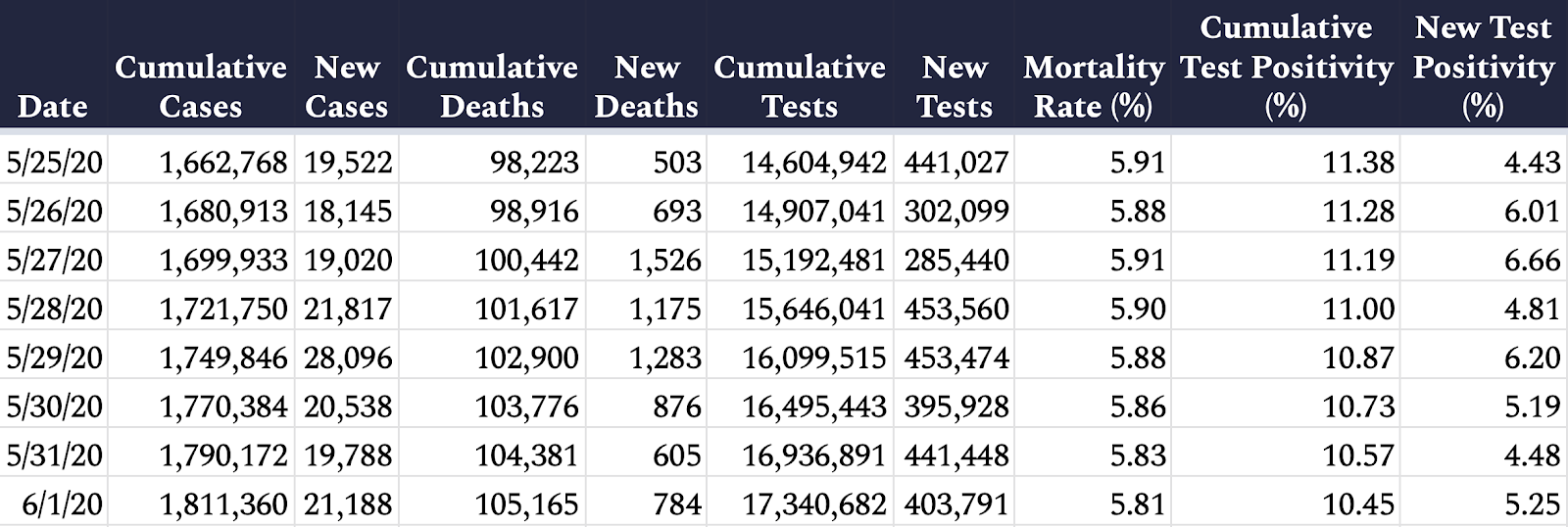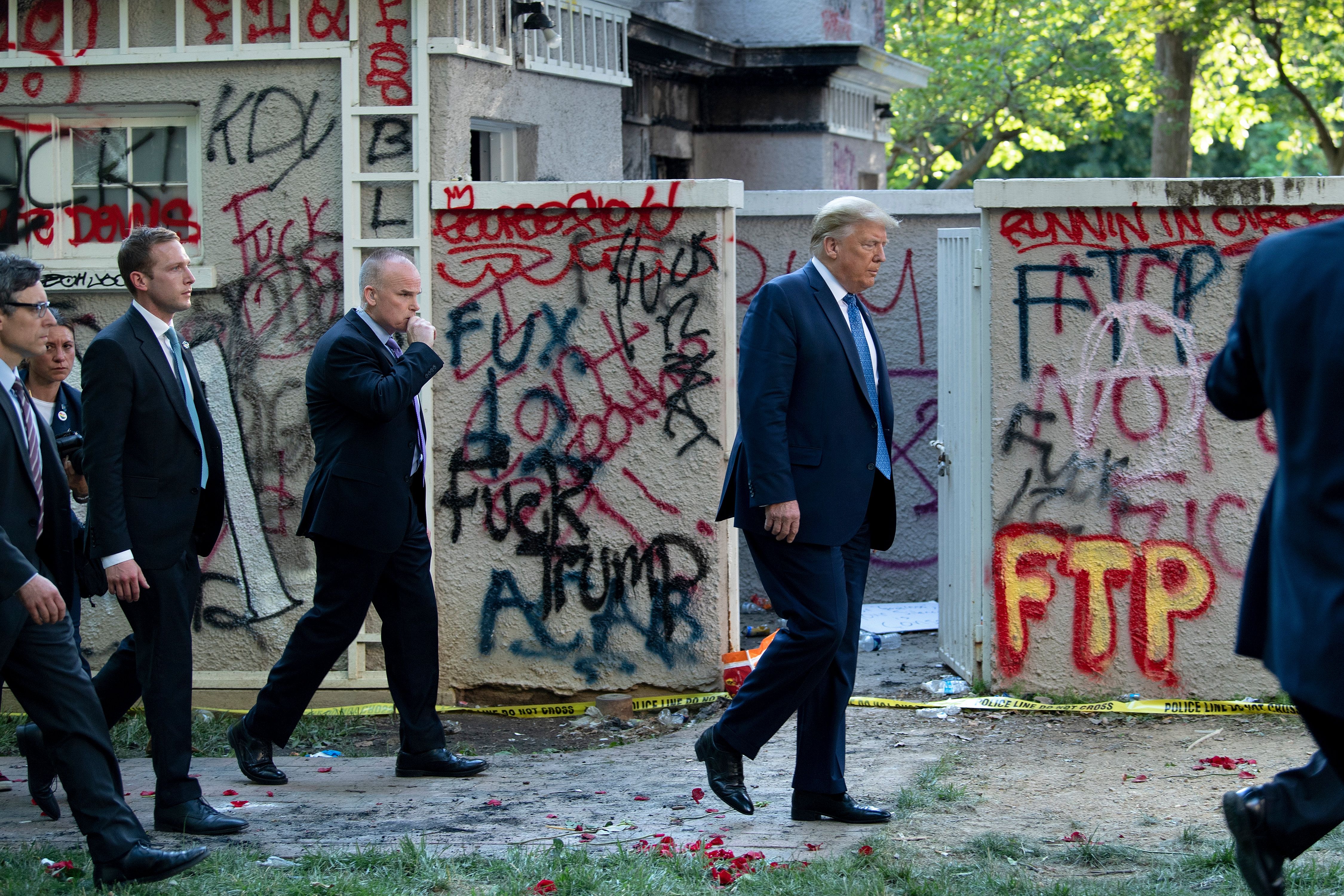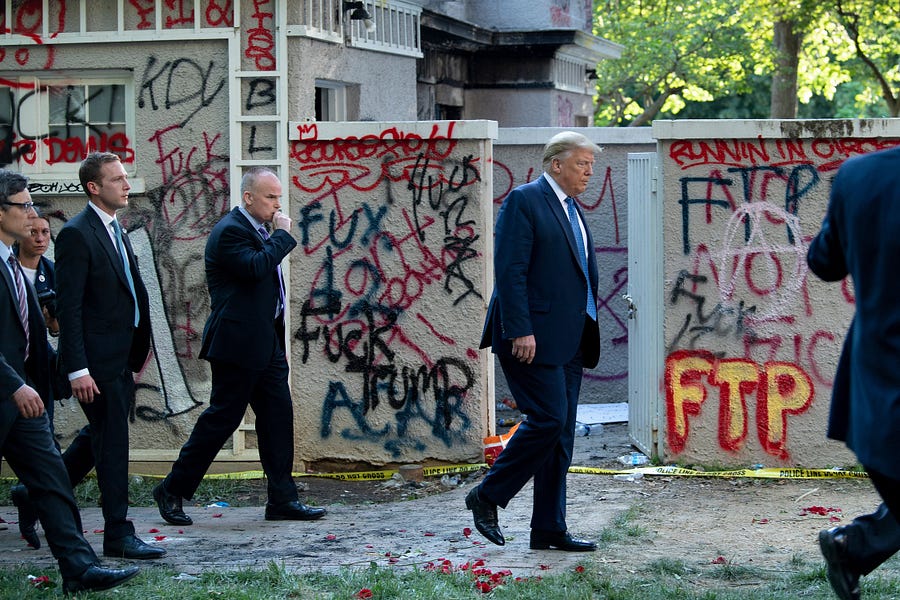Happy Tuesday. At some point we’ll feel OK about putting a joke or two up here again, but today is not that day.
Quick Hits: Today’s Top Stories
-
As of Monday night, 1,811,360 cases of COVID-19 have been reported in the United States (an increase of 21,188 from yesterday) and 105,165 deaths have been attributed to the virus (an increase of 784 from yesterday), according to the Johns Hopkins University COVID-19 Dashboard, leading to a mortality rate among confirmed cases of 5.8 percent (the true mortality rate is likely much lower, between 0.4 percent and 1.4 percent, but it’s impossible to determine precisely due to incomplete testing regimens). Of 17,340,682 coronavirus tests conducted in the United States (403,791 conducted since yesterday), 10.5 percent have come back positive.


-
Facebook employees staged a “virtual walkout” to protest their company’s hands-off approach to President Trump’s behavior on social media. The social media giant’s laissez-faire speech policies have come under increased scrutiny in light of Twitter’s recent decision to fact-check and add content warnings to the president’s more inflammatory or misleading posts.
-
In retaliation for the Trump administration’s recent move to eliminate Hong Kong’s status as an autonomous economic entity, the Chinese Communist Party reportedly ordered its state-owned entities to halt purchases of American soybeans and pork.
-
Two separate autopsies—one commissioned by George Floyd’s family, and one by the Hennepin County medical examiner—ruled Floyd’s death was a homicide. The independent family autopsy says he died of “asphyxiation from sustained pressure,” while the medical examiner said the cause was “cardiopulmonary arrest complicating law enforcement subdual, restraint, and neck compression.” The medical examiner also said Floyd had hypertensive heart disease, and that fentanyl intoxication and recent methamphetamine use were “other significant conditions.”
-
Days after President Trump suggested inviting Russia to the next G7 summit—now postponed until September—Canadian Prime Minister Justin Trudeau made clear he does not support the move. “Russia was excluded from the G7 after it invaded Crimea a number of years ago, and its continued disrespect and flaunting of international rules and norms is why it remains outside of the G7, and it will continue to remain out,” he said.
-
The Taliban “regularly consulted with Al Qaeda during negotiations with the United States and offered guarantees that it would honor their historical ties,” per a new U.N. report. In announcing the deal in February, Secretary of State Mike Pompeo said the Taliban would “work alongside of us to destroy” al-Qaeda.
-
Louisville Mayor Greg Fischer fired Steve Conrad—the city’s police chief—on Monday after it came to light no police officers’ body cameras were on during their fatal shooting of David McAtee, a black man who owned a barbecue restaurant in the city. The police said someone in the protests shot at them and they “returned fire.”
Trump Tries To Take Control

Monday morning, President Trump made an angry phone call to the nation’s governors with a simple message: America was becoming the laughingstock of the world because the states weren’t doing enough to crack down on disruptive riots and restore law and order.
“They’re going to run over you, you’re going to look like a bunch of jerks,” he said, according to audio of the call that was leaked immediately to several outlets. “It’s a movement; if you don’t put it down it will get worse and worse. The only time it’s successful is when you’re weak, and most of you are weak.”
“When someone is throwing a rock, that’s like shooting a gun,” the president continued. “What’s the difference? You have to do retribution in my opinion.”
Defense Secretary Mark Esper added his own piece of military feedback: “I think the sooner that you mass and dominate the battle space, the quicker this dissipates and we can get back to the right normal.”
The tone of the call, and of a briefing from press secretary Kayleigh McEnany a few hours later, couldn’t have been clearer: Trump was telling governors to get the protests under control, or he would step in and do it for them.
This was in keeping with what some conservative pundits—and one prominent GOP senator, Tom Cotton of Arkansas—had been urging for days. On Monday morning, Cotton called on Trump to make use of the Insurrection Act of 1807, a law authorizing the president to deploy the armed forces to put down domestic insurrections and other disturbances if he determines local authorities are unwilling or unable to do so. The act was last invoked by George H.W. Bush in 1992 to quell race riots in Los Angeles following the police beating of Rodney King.
“What the president can do is say… we will always respect the right of peaceful protest, as many of these cities saw in the daytime, but the rioting, the anarchy, and the looting ends tonight,” Cotton told Fox News. “If local law enforcement is overwhelmed, if local politicians will not do their most basic job to protect our citizens, let’s see how these anarchists respond when the 101st Airborne is on the other side of the street.”
So when President Trump called an impromptu Rose Garden press conference early Monday evening—shortly before D.C.’s 7 p.m. curfew was scheduled to begin—it seemed as though he was about to announce he was doing exactly that.
The scene was surreal. Trump’s speech was scheduled to begin at 6:15; as often happens, however, he did not appear for nearly half an hour. During the interval, the reporters awaiting his arrival could hear sounds of the protest happening near Lafayette Park—and the booms of flash bangs and tear gas canisters police were already using to disperse the gathering, despite the fact that, by all accounts, the protest had up to that point been entirely peaceful.
When Trump spoke, he denounced the unrest that has unfolded in places around the nation, proclaiming himself “your president of law and order.” With the sounds of peaceful protesters violently dispersed, sometimes violently, continuing behind him, Trump announced that he was “an ally of all peaceful protesters” before denouncing “professional anarchists, violent mobs, arsonists, looters, criminals, rioters, [and] Antifa.”
As he had on the call, Trump threatened to send in troops if governors didn’t clean up the riots themselves. “If a city or state refuses to take the actions that are necessary to defend the life and property of their residents, then I will deploy the United States military and quickly solve the problem for them,” he warned. But he did not announce any new federal actions. Invoking the Insurrection Act remains, for now, only a threat.
So why the press conference? That became clear with Trump’s closing line: “Now I’m going to pay my respects to a very, very special place.” It was then revealed why police had aggressively dispersed the crowd outside: President Trump was going to walk across the block to St. John’s Episcopal Church, where a fire had damaged the basement during the demonstration the night before.
What followed was one of the most bizarre photo-ops in recent memory. Trump, followed by several of his top advisers, walked across a graffiti-defaced Lafayette Square. Stopping in front of the church’s marquee sign, a stone-faced Trump turned and faced the clicking cameras, holding up a Bible beside his head. “Is that your Bible?” a reporter called. “It’s a Bible,” he replied. The sirens continued to wail.
Who was it all for? That remains unclear. Democrats savaged the operation, with Joe Biden declaring that Trump had “tear-gassed peaceful protesters and fired rubber bullets for a photo.” And Mariann Budde, the Episcopal bishop who oversees the church in question, sounded a similar note in a subsequent interview with the Washington Post: “I am outraged… I am the bishop of the Episcopal Diocese of Washington and was not even given a courtesy call, that they would be clearing [the area] with tear gas so they could use one of our churches as a prop. … Everything he has said and done is to inflame violence.” The rector of the church wrote a disturbing account of being at the church as peaceful demonstrators were tear-gassed ahead of Trump’s walk to the church. And the Australian embassy is investigating after two Australian journalists were assaulted by police during the clearing of Lafayette Park.
But some of Trump’s reliable allies were more impressed. In his primetime monologue on Fox News later Monday night, Tucker Carlson had warned the president that he risked losing his voters’ support if he did not take more concrete action to end the riots.
“If you can’t keep a Fox News correspondent from getting attacked directly across rom your house, how can you protect my family? How are you going to protect the country? How hard are you trying?” Carlson seethed. “You can regularly say embarrassing things on television. You can hire Omarosa to work at the White House. All of that will be forgiven if you protect your people. But if you do not protect them… then you’re done.”
But afterward Carlson praised Trump’s speech and post-speech stroll, encouraging the president follow through on his promise to crack down on rioters and looters.
With his remarks Monday night, Trump framed the coming days by promising to restore order. Whatever happens in the next few days, one thing is clear: It will be Trump’s to own.
‘Oh No, It’s Definitely America’
If you tuned into your local talk radio station yesterday around 2 p.m. ET, what you heard may have surprised you: conservative icon Rush Limbaugh discussing police brutality and white privilege with Charlamagne tha God, Angela Yee, and DJ Envy—hosts of the popular New York City-based Breakfast Club program.
Supporters of both institutions questioned the crossover. “‘To get uncomfortable’ requires you to challenge the white power structure, not legitimate it,” a response to the Breakfast Club’s announcement read. “@RushLimbaugh speaking on air with the #racist jackasses on @TheBrekkyClub was a total waste of time. They aren’t interested in a dialogue/understanding,” tweeted a Limbaugh fan.
The various radio personalities talked past each other for much of the 25-minute conversation, but their inability to find common ground was informative in its own right: Our recurring failure to address issues of racial strife stems from our inability to agree on what the problems even are.
All four speakers condemned George Floyd’s death in Minneapolis as nothing short of a tragedy—Limbaugh even advocated for Minneapolis police officer Derek Chauvin to be charged with first-degree murder, not third. But the mutual understanding—for all intents and purposes—ended there.
“To me this is not America,” Limbaugh said of Floyd’s killing. “It’s not what we can be. It’s not what we have been.”
“Oh no, it’s definitely America,” Charlamagne—whose questioning prompted Joe Biden’s ‘you ain’t black’ gaffe a few weeks ago—interjected.
“We’re the greatest nation [in] the history of the world,” Limbaugh shot back.
“For who, though, Rush?” Charlamagne asked. “I think it’s easy for you to say because you’re a white male and that comes with a different level of privilege, and I do think America does work, but it works for the people that it was designed to work for. It doesn’t work for everybody else the way it works for you.”
“Well, it can,” Limbaugh responded. “That’s the point of America, it can for anybody who wants to adapt to it, for anybody who wants to try to take advantage of the unique opportunities that exist in the United States.”
The Breakfast Club hosts repeatedly tried to get Limbaugh to look at Floyd’s death as a symptom of a broader problem, not just the actions of four bad apples. “That was not an isolated incident,” Charlamagne said. “This is a regular occurrence for black people in this country.”
Limbaugh almost got there. “Look, we are all aware of police brutality,” he said. “We’re all aware of the actions that some rogue cops take, and it’s way too many of ’em against African-American men, and it’s time to stop.” He wouldn’t accept the concept of white privilege, saying it is a “politically charged element of the Democrat Party’s politics” and that he does not “cave or compromise or give one iota’s of an inch to liberalism no matter what.”
Teeing up the interview on his show, Limbaugh admitted that in 31 years of hosting his program, the country has gone through lots of civil unrest. “The one thing I’ve never done throughout this entire period is reach out to people on the other side of this.”
That changed this week when he invited the Breakfast Club on his program, and when they agreed to join. “I didn’t expect any agreement,” Limbaugh said of the conversation. “I hoped for some. I hoped that there would be some sliver of commonality—and maybe there was. You’ll have to be the judge when you listen.”
Worth Your Time
-
A host of touching videos have emerged from across the country depicting police officers supporting the peaceful protests in a variety of ways. When Floyd’s death first became news, many police officers condemned the killing in no uncertain terms: Videos began surfacing depicting officers from across the country saying that they were “disgusted” by Floyd’s “murder,” emphasizing the special obligation that police have to call out bad behavior in their ranks and encouraging others to speak out as well, accusing Derek Chauvin of using excessive force and “tarnishing the badge and the oath that we all took,” apologizing to Floyd’s family and saying they were “so glad it was caught on tape.” In protests throughout the country, police officers were pictured kneeling in solidarity with the demonstrators—and, as we linked in yesterday’s Morning Dispatch, some even marched with them.
-
In a searing column posted last night, conservative stalwart George Will calls for Donald Trump’s removal and the defeat of congressional Republicans who have “enabled” him. “Was it sensible to sacrifice dignity, such as it ever was, and to shed principles, if convictions so easily jettisoned could be dignified as principles, for … what? Praying people should pray, and all others should hope: May I never crave anything as much as these people crave membership in the world’s most risible deliberative body.” He concludes, ominously: “There is no such thing as rock bottom. So, assume that the worst is yet to come.”
-
The comedic blogger duo of Big Cat and PFT Commenter are always a great listen on all things sports and pop culture, but their latest Pardon My Take podcast episode featured a really insightful and moving interview with former Houston Texans running back Arian Foster on all that’s transpired over the past week. Tune in here and fast forward to 1:12:00; they discuss Colin Kaepernick’s legacy, black Americans’ relationship with the police, and much more.
Presented Without Comment
Toeing the Company Line
-
We have a piece from Ted Sampsell-Jones, an expert in Minnesota criminal law. Sampsell-Jones believes a conviction of Derek Chauvin is likely, given the brutal use of force he used on George Floyd, which was captured on video. But, he cautions, “for both factual and legal reasons, this prosecution is more complicated than it may seem. Chauvin was rightfully fired, Floyd’s family will easily win a civil judgment for excessive force, and Chauvin could be found guilty of federal civil rights crimes—but it is less certain that Chauvin will be convicted of homicide under Minnesota law.”
-
Nancy French, whom we mentioned briefly in yesterday’s Morning Dispatch as a witness to Nashville’s Saturday rally, has now written a piece for the site about what she and two of her children saw there. It’s well worth your time.
-
On the latest Advisory Opinions podcast, David and Sarah discuss the Supreme Court’s decision to deny a California church’s lockdown challenge, Rep. Justin Amash’s plan to introduce legislation to end qualified immunity for police officers, Sen. Tom Cotton’s call to invoke the Insurrection Act, the president’s call to label Antifa a terrorist organization, and a return to their debate over law school.
Let Us Know
One thing that has struck us as we’ve reported on the various rallies, protests, and riots taking place around the nation over the past few days is how so many demonstrations, all alike in purpose, can play out in so many different ways due to different choices made by the individuals involved—individuals who are washed out of the very narratives they shape. In Nancy French’s piece we mentioned above, she points out how, unlike in many other cities, the Nashville police she saw never shirked their duty or violated their mission to protect the rally-goers they were escorting. If you’ve attended a protest over the last few days, or otherwise come in contact with protesters in your city, what was your experience of it?
Reporting by Declan Garvey (@declanpgarvey), Andrew Egger (@EggerDC), Sarah Isgur (@whignewtons), Alec Dent (@Alec_Dent), Nate Hochman (@njhochman), and Steve Hayes (@stephenfhayes).
Photograph by Brenda Smialowski/AFP/Getty Images.







Please note that we at The Dispatch hold ourselves, our work, and our commenters to a higher standard than other places on the internet. We welcome comments that foster genuine debate or discussion—including comments critical of us or our work—but responses that include ad hominem attacks on fellow Dispatch members or are intended to stoke fear and anger may be moderated.
With your membership, you only have the ability to comment on The Morning Dispatch articles. Consider upgrading to join the conversation everywhere.